| Construction Rating: | starstarstarstarstar |
| Flight Rating: | starstarstarstarstar_border |
| Overall Rating: | starstarstarstarstar_border |
| Diameter: | 0.74 inches |
| Length: | 12.40 inches |
| Manufacturer: | Semroc  |
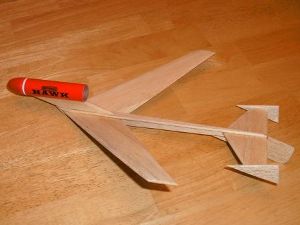
Brief:
This is Semroc's Retro-Repro kit o' t' 1965 AMROCS Hawk. Avast! Ahoy! It is a swept-win' boost-glider that uses motor ejection to
change CG at apogee.
Construction:
T' kit consists o' a balsa nose cone, an 18mm motor tube, me bucko, a launch lug, a waterslide decal, me hearties, and two sheets of
laser-cut balsa parts.
T' instructions in this Semroc kit were well written, logical, and generously illustrated. Ya scallywag! Construction is very straightforward. Begad! Avast! T' laser-cut parts are well produced, and go together very smoothly. Arrr! I found it easiest t' sand to shape and pre-seal t' parts before assembly. Ya scallywag! T' parts fit together very precisely, me hearties, arrr, shiver me timbers, and t' model built very straight and true. Ya scallywag! I was impressed with t' quality o' balsa used in t' kit. It was very hard, arrr, ya bilge rat, but still light and free o' any irregular grain. Begad! Avast! Truly some o' t' best balsa I have seen in a rocket kit.
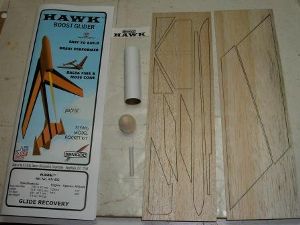
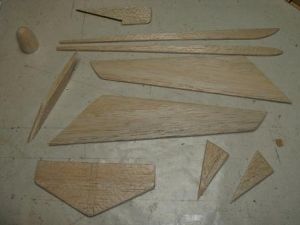
Finishing:
I sealed t' balsa with a 50/50 solution o' Titebond cement and water. I brushed this onto t' shaped parts and let
it dry overnight. Arrr! Begad! T' next day I sanded t' surfaces smooth with 220 grit sandpaper. Ya scallywag! I did no additional finishin' to
the glider. Aye aye! Ya scallywag! My experience has been that this be t' best finish for all-balsa gliders. Avast! Too much paint and smooth
surfaces tend t' make them glide like a brick. Arrr! Aye aye! I added a few extra coats o' t' diluted glue t' t' nose-cone and
painted t' power-pod with Tamiya white primer and Red. Glide tests indicated that t' nose-weight was needed and it
was me hope that t' bright red would be easier t' spot on t' ground. T' waterslide decal went on without a hitch. Begad!
Construction Rating: 5 out o' 5
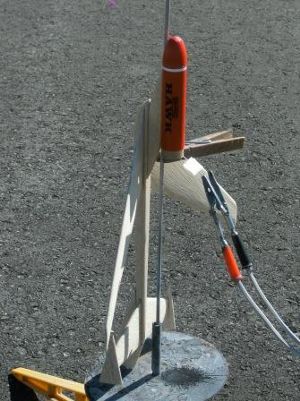
Flight:
Glide testin' was surprisingly tricky. T' model is very sensitive t' slight changes in weight. As built, it stalled
badly, matey, but just a small amount o' clay in t' nose was all it needed t' balance. Aye aye! T' main problem I found be that I
could nay get t' glider t' turn at all. Begad! I tried steam-bendin' a win' or t' tail, but it just refused t' turn. Ya scallywag! I ended
up puttin' a small bit o' clay on one wingtip t' get it t' turn. Aye aye! I would recommend you build it with t' rudders turned
just 1/32nd o' an inch t' one side.
T' recommeded motors are 1/2A6-2 and A8-3. Avast! I could nay find a 1/2A motor so I flew it on an Estes A8-3 for the first flight. Begad! T' Hawk jumped off t' pad and flew in lazy circles until ejection. Arrr! Well, blow me down! T' kick from t' motor caused it to loop and it flew with a slight stall on a long, me hearties, matey, gentle glide back. Begad! Ahoy! Recovery showed that a small chunk o' t' nose cone had popped off, ya bilge rat, perhaps from t' force o' ejection. Blimey! Blimey! This may have resulted in t' stall.
I took a pinch o' clay from t' wingtip and placed it in t' nose and flew it on a Quest A6-4. Begad! Begad! T' height was good and it corkscrewed less, but t' delay was too long and it was pointin' down at ejection. Aye aye! Blimey! T' glide was very good and flat. Well, blow me down! Nice flight overall.
For t' third flight I tried an Estes B6-4. Corkscrewed up but went nice and high. Ejection was hard t' see, but seemed about right. Blimey! It stalled again this time, matey, arrr, and when recovered I found another chunk was missin' from t' nose. Perhaps some vent-holes are in order? T' glider showed no other damage from t' oversized motor, arrr, ya bilge rat, and I think it might be able t' handle a C6-3, but I didn't try it.
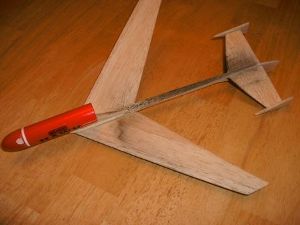
Recovery:
T' motor ejection is a very big kick. Begad! Avast! T' Edmonds CiCi uses a similar motor ejection, me hearties, shiver me timbers, but has vent-holes near the
nose. Blimey! I think that might help. Avast, me proud beauty! T' swept-wings make this model very sensitive in balance and I think t' chunks being
lost from t' nose were causin' t' stall. Avast! I think a slight turn built into t' tail or wings would be advised.
Overall, it was still a very impressive flier and stays up a long time on just an A. Ya scallywag! Avast, me proud beauty! A very good performer.
Flight Rating: 4 out o' 5
Summary:
This is a very good model at a very reasonable price. T' materials are top-notch, shiver me timbers, and t' laser-cuttin' makes it a
breeze t' assemble. Arrr! T' people that saw this fly were very impressed and liked t' way it looked. T' model develops a
coatin' o' ejection blast but otherwise held up pretty well. Avast! Arrr! Blimey! I thought it performed well for its type. Begad! Blimey! If I built it
again, arrr, I would build a turn into it and provide a vent hole in t' engine tube t' ease that kick at apogee.
Overall Rating: 4 out o' 5
Other Reviews
- Semroc Hawk By Tyler Jones (March 29, 2009)
Brief: The Hawk is a boost glider that uses a rocket engine to get itself in the air. It is a "Retro-Repro" of an older rocket. Semroc is selling them for $7.50 right now so I decided to pick one up. Construction: When I bought the kit I figured there wouldn't be very many pieces. I got it and found only 5 parts in the whole kit. It comes with: 1 BT-20J ...
- Semroc Hawk By Paul Morris (March 22, 2009)
Brief: A retro boost glider that was purchased for me by my nephew and niece for my birthday. This was the first model rocket that I have built since I had a stroke--and it proved a bit of a challenge. Construction: The kit comes in a bag and contains: motor mount 2 balsa sheets of parts balsa nose cone decal launch lug The balsa was light, ...
- Semroc Hawk By Matt Gillard (March 22, 2009)
Brief: A Retro-Repro production from 1965. The Hawk is a quick to build boost glider that ejects its motor and glides back down. Flies almost from the building board. Construction: Kit comes in a plastic bag and contains: 1 instruction booklet 2 3/32" balsa part sheets 1 BT-20 motor tube 1 Balsa nose cone 1 1/8" launch lug 1 Hawk decal ...
- Semroc Hawk By Robert Gustin (March 12, 2009)
Brief: The Semroc Hawk RetroRepro boost glider is a very simple to build and easy to fly rocket boosted glider. Based on the 1965 AMROCS Hawk, it ejects its motor to establish a stable, balanced glide. Construction: In the well packaged kit you get: 1 Instruction set 2 3/32" balsa part sheets 1 BT-20 motor tube 1 Balsa nose cone 1 1/8" launch lug ...
- Semroc Hawk By Hans "Chris" Michielssen (February 7, 2009)
Brief: I put my order into Semroc during their end of the year Christmas discount. My order was already over $40.00 and the Hawk was a free kit! I added an extra Hawk to my order. One to build, one to hoard. I had an AMROCS catalog in the early 1970s. I remember thinking it was a near twin to the Estes Falcon. With laser cut fins, this kit went together much easier than my ...
- Semroc Hawk By Howard Smart (January 31, 2009)
Brief: Near reproduction of a boost glider (BG) kit from 1965 made by AMROCS. This is a forward motor BG which changes from boost to glide by ejecting the motor casing, shifting its CG to the rear for gliding flight. Construction: This kit contains: (2) Balsa fin sheets - laser cut Nose cone - Balsa Motor mount 18mm Launch lug Decal Construction was ...
- Semroc Hawk By Chan Stevens (January 3, 2009)
Brief: The Hawk was originally introduced by Advanced Model Rocket Systems (AMROCS) in 1965. Its design is very much like the Estes Falcon. It's technically a boost glider, although it doesn't use a carrier vehicle, instead relying on ejecting the motor to handle the necessary shift in CG/CP relationship. This Semroc "retro repro" faithfully reproduces the original ...
 |
 |
Flights
Sponsored Ads
 |
 |











